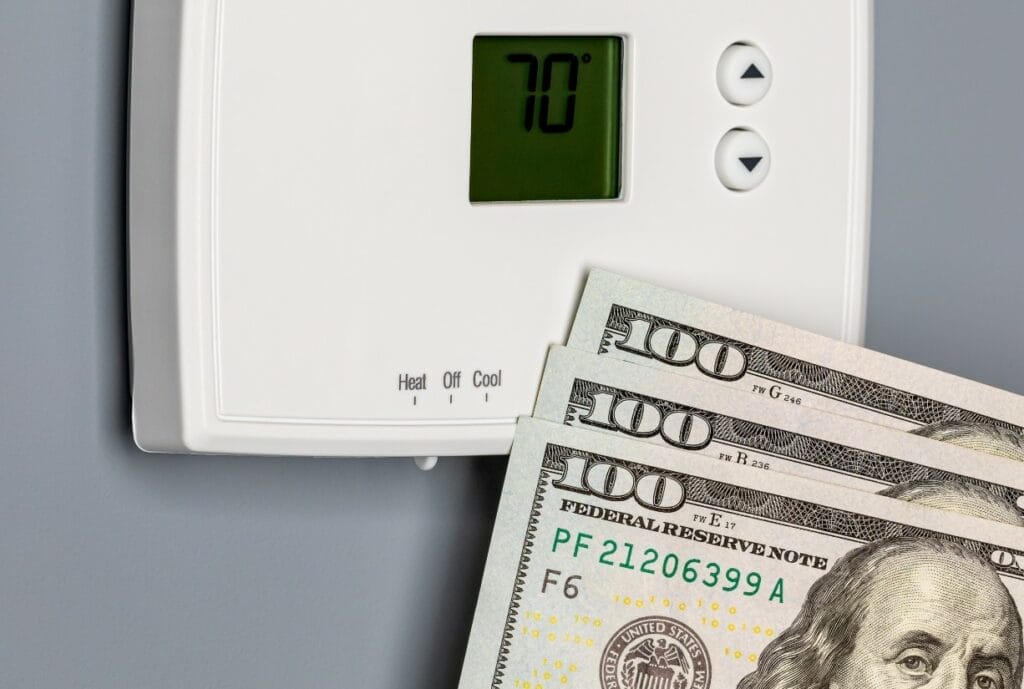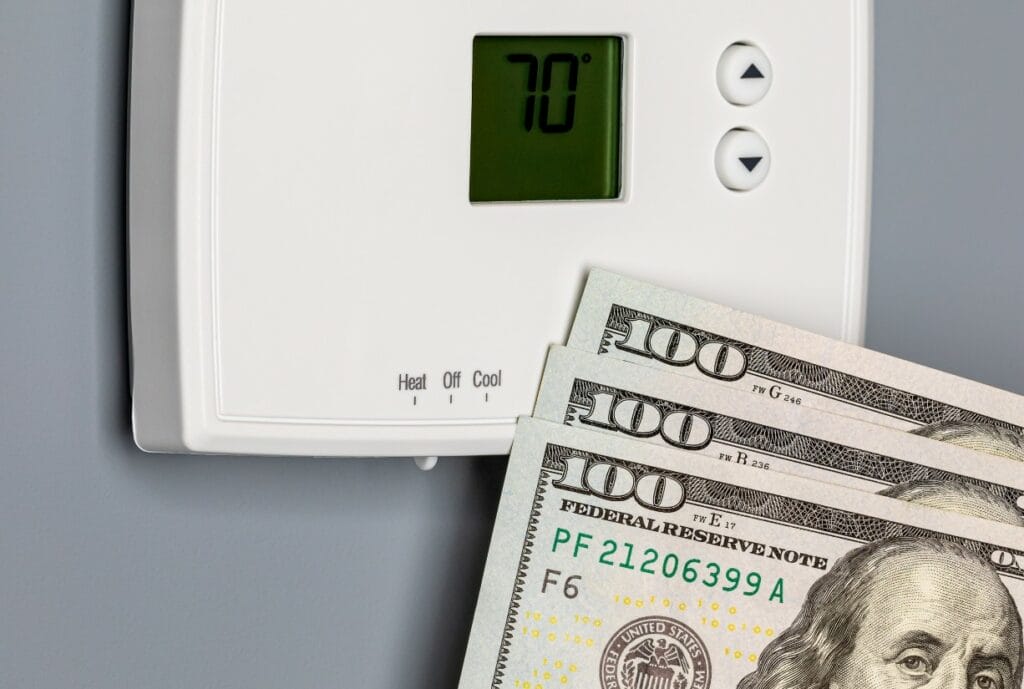This post originally appeared at https://www.badgerinstitute.org/the-cold-hard-facts-about-the-cost-of-eliminating-fossil-fuels-in-wisconsin/
And a reality check regarding what even progressives are willing to pay
The next time your progressive friends in, say, Superior or Eau Claire or Green Bay argue that saving the globe necessitates eliminating fossil fuel use by 2050 and that they intend to do it, ask them a couple simple questions:

- How much are you willing to pay on a monthly basis to combat climate change?
- How much do you think it will cost to just stop using a natural gas furnace, the kind used by about two-thirds of Wisconsinites, and switch over to a heat pump run on electricity?
Make it easy on them. Tell them to forget all the other costs of eliminating gas- or diesel-powered engines, about price hikes for everything you buy that’s manufactured in factories that use fossil fuels or that’s shipped on boats or planes or trucks that burn oil or diesel or some other sort of refined petroleum. Don’t even bring up the fact that a lot of electricity is produced in power plants that themselves burn gas or coal.
Make the first question specific, the same way the American Enterprise Institute’s Survey Center on American Life (SCAL) did in a survey of more than 6,000 Americans in the spring of 2023:
“Suppose a proposal was on the ballot next year to add a monthly fee to consumers’ monthly electricity bill to combat climate change. If this proposal passes, it would cost your household $10 every month. Would you vote in favor of this monthly fee to combat change, or would you vote against this monthly fee?” they asked.
The result: Only 26% would vote in favor.
What about $40 per month? Only 15% in favor.
Seventy-five per month?
The percentage of Americans willing to pay $75 every month dropped to only 9%, according to the SCAL survey. Sixty-nine percent would vote against the $75 fee, and another 22% either didn’t know or declined to answer.
Now for the cold, hard facts.
It would cost on average in Wisconsin an additional $172 per month to use a heat pump rather than a natural gas furnace in a new house, according to economists who built a model for the Badger Institute to estimate those increased operating costs. And it would cost a lot more than that up north.

This makes total sense. Heat pumps are sometimes described as “air conditioners that can be operated in reverse.” Popular in some warmer parts of the country, they basically extract heat from the outside air and use it to raise the indoor air temperature.
The colder the weather, it follows, the greater the need for electricity to power the pump. When the outdoor temperature is down below 3 degrees, in fact, you also need a backup, something like an electric heating element.
In Superior – a really cold place in the winter – the added cost of using a heat pump in a new home rather than a gas furnace is $251 per month, according to the paper, “The cost of outlawing fossil fuel heat in Wisconsin,” by economists Andrew Hanson, a visiting fellow here at the Badger Institute, and Zackary Hawley.
In Milwaukee, a relatively warmer locale, one where the economists assume you would not need backup heat, the increase would be $113 per month. In Green Bay, $150. In Eau Claire, $189.
Those numbers are based on a 2,500-square-foot home heated to only 65 degrees. Detailed explanations regarding assumptions about running time of furnaces and heat pumps, the cost of electricity versus natural gas, and even such things as “shell efficiency” of homes, are available in the paper at www.badgerinstitute.org.
Heat pumps, it’s true, are cheaper to install. Lots of people use them in warmer climates. But the full additional cost over 15 years of a de facto heat pump mandate expressed in today’s dollars – including initial cost, maintenance and operation – would still be $19,976 on average in Wisconsin. In Superior, the most northern city the economists modeled, that would rise up to an estimated $29,837.
Neither the economists nor the Badger Institute are arguing against heat pumps, which warm as many as 40% of homes in states such as Alabama or the Carolinas. And we wholeheartedly support finding responses to climate change that don’t destroy the economy that we need to advance realistic solutions.
Eliminating fossil fuels quickly and completely isn’t anywhere close to realistic. Americans, regardless of political identity, can’t or won’t pay.
Ruy Teixeira, a nonresident senior fellow at AEI, has pointed out that, in that survey, independent voters are opposed to a $20 monthly levy to combat climate change by 50 points.
“Even voters who currently support Biden against Trump and those who voted for Biden in 2020 move into opposition at this point,” he wrote recently.
And that’s at only $20 per month. The true cost of merely switching away from natural gas furnaces in Wisconsin to heat pumps would be five or eight or even 12 times that, depending how cold it is.
After you show your progressive friends the facts, maybe ask them one last question.
If you’re not willing to pay, who do you think should?
Mike Nichols is the President of the Badger Institute. Permission to reprint is granted as long as the author and Badger Institute are properly cited.
Submit a comment
“*” indicates required fields
/* = 0;if(!is_postback){return;}var form_content = jQuery(this).contents().find(‘#gform_wrapper_21’);var is_confirmation = jQuery(this).contents().find(‘#gform_confirmation_wrapper_21’).length > 0;var is_redirect = contents.indexOf(‘gformRedirect(){‘) >= 0;var is_form = form_content.length > 0 && ! is_redirect && ! is_confirmation;var mt = parseInt(jQuery(‘html’).css(‘margin-top’), 10) + parseInt(jQuery(‘body’).css(‘margin-top’), 10) + 100;if(is_form){jQuery(‘#gform_wrapper_21’).html(form_content.html());if(form_content.hasClass(‘gform_validation_error’)){jQuery(‘#gform_wrapper_21’).addClass(‘gform_validation_error’);} else {jQuery(‘#gform_wrapper_21’).removeClass(‘gform_validation_error’);}setTimeout( function() { /* delay the scroll by 50 milliseconds to fix a bug in chrome */ jQuery(document).scrollTop(jQuery(‘#gform_wrapper_21’).offset().top – mt); }, 50 );if(window[‘gformInitDatepicker’]) {gformInitDatepicker();}if(window[‘gformInitPriceFields’]) {gformInitPriceFields();}var current_page = jQuery(‘#gform_source_page_number_21’).val();gformInitSpinner( 21, ‘https://e74sq7k37a8.exactdn.com/wp-content/plugins/gravityforms/images/spinner.svg’, true );jQuery(document).trigger(‘gform_page_loaded’, [21, current_page]);window[‘gf_submitting_21’] = false;}else if(!is_redirect){var confirmation_content = jQuery(this).contents().find(‘.GF_AJAX_POSTBACK’).html();if(!confirmation_content){confirmation_content = contents;}jQuery(‘#gform_wrapper_21’).replaceWith(confirmation_content);jQuery(document).scrollTop(jQuery(‘#gf_21’).offset().top – mt);jQuery(document).trigger(‘gform_confirmation_loaded’, [21]);window[‘gf_submitting_21’] = false;wp.a11y.speak(jQuery(‘#gform_confirmation_message_21’).text());}else{jQuery(‘#gform_21’).append(contents);if(window[‘gformRedirect’]) {gformRedirect();}}jQuery(document).trigger(“gform_pre_post_render”, [{ formId: “21”, currentPage: “current_page”, abort: function() { this.preventDefault(); } }]); if (event.defaultPrevented) { return; } const gformWrapperDiv = document.getElementById( “gform_wrapper_21” ); if ( gformWrapperDiv ) { const visibilitySpan = document.createElement( “span” ); visibilitySpan.id = “gform_visibility_test_21”; gformWrapperDiv.insertAdjacentElement( “afterend”, visibilitySpan ); } const visibilityTestDiv = document.getElementById( “gform_visibility_test_21” ); let postRenderFired = false; function triggerPostRender() { if ( postRenderFired ) { return; } postRenderFired = true; jQuery( document ).trigger( ‘gform_post_render’, [21, current_page] ); gform.utils.trigger( { event: ‘gform/postRender’, native: false, data: { formId: 21, currentPage: current_page } } ); if ( visibilityTestDiv ) { visibilityTestDiv.parentNode.removeChild( visibilityTestDiv ); } } function debounce( func, wait, immediate ) { var timeout; return function() { var context = this, args = arguments; var later = function() { timeout = null; if ( !immediate ) func.apply( context, args ); }; var callNow = immediate && !timeout; clearTimeout( timeout ); timeout = setTimeout( later, wait ); if ( callNow ) func.apply( context, args ); }; } const debouncedTriggerPostRender = debounce( function() { triggerPostRender(); }, 200 ); if ( visibilityTestDiv && visibilityTestDiv.offsetParent === null ) { const observer = new MutationObserver( ( mutations ) => { mutations.forEach( ( mutation ) => { if ( mutation.type === ‘attributes’ && visibilityTestDiv.offsetParent !== null ) { debouncedTriggerPostRender(); observer.disconnect(); } }); }); observer.observe( document.body, { attributes: true, childList: false, subtree: true, attributeFilter: [ ‘style’, ‘class’ ], }); } else { triggerPostRender(); } } );} );
/* ]]> */
The post The cold, hard facts about the cost of eliminating fossil fuels in Wisconsin appeared first on Badger Institute.
